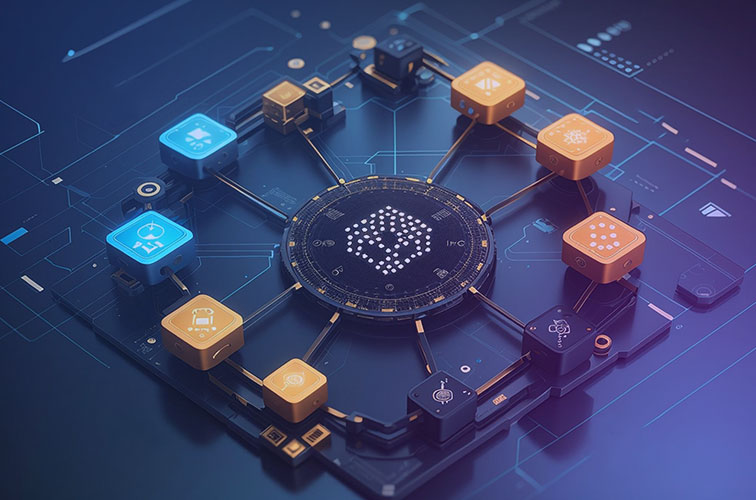Over the past decade, Non-Fungible Tokens (NFTs) have nowadays one of the major phenomena on the internet. Non-fungible tokens (NFTs) are different types of digital properties that are based on the immutable blockchain network, i.e., distributed digital accounting books. Security remains an important issue in the NFT market as more NFT holders come on board to trade with each other through various NFT marketplaces. Here, we shall discuss security in the NFT marketplace by identifying some techniques that can be utilized for protection from dangers.
The Role Of Blockchain Technology

At the core of any NFT market is blockchain technology. It helps assure transparency, immutability, as well as security. Blockchain utilizes a decentralized system of connected computers or nodes that coordinate to ensure the verification of the transactions and then record every transaction. This is achieved through an encryption process that links each transaction with its predecessor. The decentralized characteristic eliminates such necessities as intermediate and renders the manipulation of and/or alteration of data by hacks virtually impossible.
Steps To Safeguard
Now let’s take a glance at the important steps that can help you keep your NFT marketplace completely secure against the latest cyber threats. Check it out.
1. Implementing Robust Authentication Mechanisms
An important element of safeguarding NFT marketplaces is authentication. It is, therefore advisable to have strong authentication mechanisms such as 2FV and biometrics for the users verification process. Multiple ways of authentication minimize the probability of non-privileged persons accessing one’s account and NFT assets.
2. Conducting Regular Security Audits
The NFT’s marketplace infrastructure should be regularly audited for any vulnerabilities and weaknesses. Experienced blockchain developers or even external security firms can carry out these audits. Analyzing the code, architecture, and configuration can detect those potential loopholes before they happen and, therefore, deal with them immediately.
3. Employing Encryption and Secure Storage
The protection of end-user information, as well as NFTs, is very crucial, and encryption has been instrumental. All the data, such as user credentials, transaction details, NFT metadata, etc., must be encrypted using a strong encryption algorithm. Additionally, NFT marketplaces should store user assets in secure, offline storage solutions known as cold wallets. Cold wallets are not connected to the internet, making them less susceptible to hacking attempts.
4. Educating Users about Security Best Practices
User education is crucial in maintaining a secure NFT marketplace. Marketplaces should provide comprehensive guides and resources that educate users on security best practices. This includes creating strong passwords, avoiding suspicious links or downloads, and being cautious when interacting with unknown individuals or platforms. By empowering users with knowledge, they can actively contribute to maintaining a secure ecosystem.
5. Implementing Monitoring and Intrusion Detection Systems
To detect and respond to potential security threats in real-time, NFT marketplaces should deploy monitoring and intrusion detection systems. These systems continuously monitor network traffic, user activities, and system logs for any suspicious behaviour or unauthorized access attempts. By promptly identifying and mitigating threats, the marketplace can minimize potential damage and protect user assets.
6. Regularly Updating and Patching Software
Keeping all software components up to date is crucial for maintaining a secure NFT marketplace. This includes the underlying blockchain tech, smart contracts, and any third-party tools or libraries used. Regular updates and patches often include security enhancements and bug fixes that address known vulnerabilities. By staying up to date, NFT marketplaces can ensure they are protected against the latest threats.
Final Thoughts
So, security is of utmost importance in NFT marketplaces. With the increasing popularity of blockchain technology and the growth of the NFT market, it is crucial for marketplaces to prioritize security measures to safeguard user assets and maintain trust. By implementing robust authentication mechanisms, conducting regular security audits, employing encryption and secure storage, educating users, implementing monitoring systems, and regularly updating software, NFT marketplaces can effectively protect against potential threats and provide a secure environment for users to trade and interact with NFTs.
Disclaimer:Our website provides educational information only and is not intended to provide financial or professional advice. We are not responsible for the accuracy, reliability, or completeness of the information provided. Any reliance you place on the information is at your own risk, and we recommend consulting a qualified professional before making any financial or investment decisions. We are not liable for any loss or damage resulting from the use of our website or the information provided.
